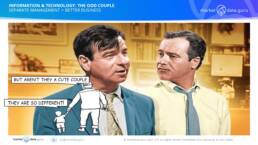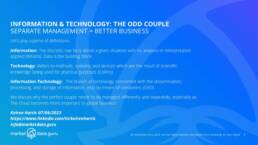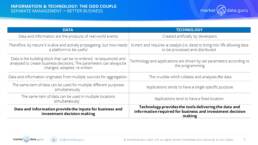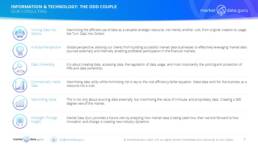

1.0 INCOMPATIBLE COMPATABILITY
Neil Simon’s 1965 Broadway play (later a film) depicts neat-freak Felix and fun-loving slob Oscar who through circumstances share an apartment. In some ways Felix represents order and process driven technology while Oscar is the freewheeling ‘Data wants to be free’ (Stewart Brand) information character.
Despite being fundamentally different, technology and information cannot live without each other. As it is well documented technology facilitates the use of information, in turn information relies upon technology to be used. This creates a circle whereby more information leads to investment in better technology enabling greater amounts of information to delivered and processed, and so the universal requirement for both expands.
Information and Technology are symbiotic, needing each other to thrive.
Despite the differences in form and concept.
Information Technology brings the two together in one place. Because of this too many organisations, businesses, banks and companies fail to differentiate between them, deciding to manage the both together as a technology driven entity (putting data, especially market data into procurement is not the answer). This produces two results:
1.Increased costs
2.Lower data productivity, negatively impacting the business, because information becomes secondary to the tech
2.0 DATA VERSUS TECHNOLOGY
IFA Magazine reported ‘Data is poorly understood, inadequately valued and badly managed by global businesses costing them and their investors billions of dollars every year. This is a big problem because it means most businesses are running on data that isn’t fit for purpose.’
While big businesses are the most profligate all businesses suffer from the effects of poor information and data management because companies prioritise technology over data, especially in terms of investment. The statistical result is concerning and can be summarised:
- 91% of business leaders admit data is critical to business success
- However less than half (34%) manage data effectively
- Technology is prioritised by an overwhelming 73% of businesses compared to information 27%
- For 88% of businesses technology receives five and a half times the budget as data
- 76% of businesses say they are now investing in data and digital transformation strategies
For all this when making important business decisions while technology delivers data, it is the information and analysis that companies act on.
As this is the case why is information the little brother?
It comes down to management. IT is all about delivering services to the business, information is about the business, IT managers do not make business decisions.
3.0 LET INFORMATION BE FREE
While information and technology co-exists in harmony, how information is managed should be separated out. Why? Taking market data as an example of leading edge usage in financial markets, though the same principle applies to all businesses, plus governments, well anyone relying on tech delivered information
Both information and technology rely upon Intellectual Property Rights and licences to ‘sell’ their product, but the terms of the licence’s usage are fundamentally different in terms of usage rights, especially as the same item of data can be used for multiple (and therefore charged multiple times) purposes at the same time.
What differentiates the two practically (and simply)?

4.0 THE FUTURE & WHY THE CLOUD MAKES A DIFFERENCE TO MANAGEMENT
Perhaps we should look to what is happening in the Cloud to see why technology and information are different. Leading Cloud tech providers like BCC Group and Pegasus ES are deliberately data agnostic, they want to drive as much processing to their engines and the only way to do that is to avoid tying themselves to specific information vendors. This deliberate strategy broadens their appeal to the widest possible universe of consumers. This forces the data consumer to differentiate between information and technology.
Likewise, the Cloud means data owners are free to select their own channels to clients, to the extent that Big Tech like AWS, Google and Microsoft have entered deep partnerships with exchange groups like CME, DBAG, LSEG and NASDAQ to lock in their partners data to their own environments.
The Cloud reinforces the ‘Odd Couple’ relationship while at the same time makes it ‘Open’.
Businesses that manage information and data in a standalone business unit will unlock information as a true resource within the business itself, not just an adjunct of technology or another cost, and will gain and maintain a competitive advantage in an ever more datacentric world.
Keiren Harris
07 June 2023
For our information on our consulting services please visit www.marketdata.guru/data-compliance
Or Email knharris@marketdata.guru
General contact info@marketdata.guru and to obtain a pdf copy of the article
#data #technology #IT #cloud #marketdata #applications #financialinformation #business


